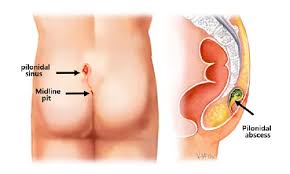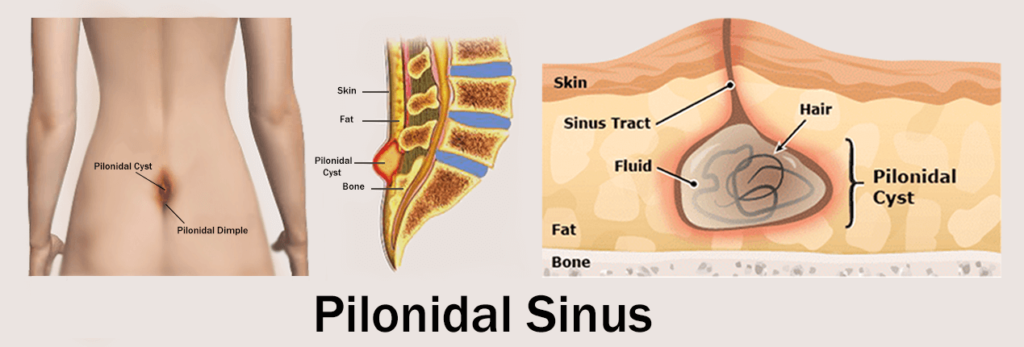Pilonidal Sinus
Understanding Pilonidal Sinus: Causes, Symptoms, and Treatment Options
A pilonidal sinus is a small tunnel or tract located just above the cleft of the buttocks. It is often filled with hair, debris, and skin cells and can cause significant discomfort, pain, and infection if left untreated. This blog will guide you through the causes, symptoms, grades, and treatment options for pilonidal sinus and explain why Surgiplus Hospital in Nagpur, led by Dr. Pitambar Masram, is the best choice for effective treatment.

What is Pilonidal Sinus?
A pilonidal sinus is a small, often painful, abnormal tract or cavity located at the top of the buttock crease. It is usually formed when hair follicles become clogged with hair, dirt, and debris, leading to the formation of a cyst or abscess. Over time, this can develop into an infected or chronic sinus, resulting in pus or blood drainage. Pilonidal sinuses most commonly affect young adults and are more frequent in men.
While pilonidal sinus can be asymptomatic, it can lead to recurrent infections, causing significant discomfort if not properly managed.
How Does Pilonidal Sinus Develop?
The development of a pilonidal sinus typically occurs in two stages:
- Hair and Debris Infiltration: The condition usually begins when hair follicles in the skin above the buttocks become clogged with hair, skin cells, or debris. This blockage causes irritation and forms a small cyst or abscess.
- Infection and Abscess Formation: If the cyst or abscess becomes infected, it may rupture, leading to drainage of pus or blood. The infection can cause the formation of a sinus or tract that connects the cyst to the skin’s surface. Over time, this can lead to chronic infections, abscess formation, and recurring flare-ups.
What Are the Grades of Pilonidal Sinus?
Pilonidal sinus is often graded based on its severity, the extent of the cavity, and the presence of infection. Understanding these grades helps determine the most appropriate treatment plan.
- Grade 1 (Superficial Pilonidal Sinus): The sinus is small, with minimal infection, and is typically located close to the skin’s surface.
- Grade 2 (Chronic or Simple Pilonidal Sinus): The sinus is deeper, with larger cavities and more pronounced infection, often leading to persistent drainage.
- Grade 3 (Complex Pilonidal Sinus): The sinus is large, with multiple tracts or abscesses, often associated with significant tissue damage or recurrent infections.
- Grade 4 (Recurrent or Severe Pilonidal Sinus): This grade involves extensive tissue damage, recurrent infections, or an open wound that may not heal, often requiring surgical intervention.
What Are the Symptoms of Pilonidal Sinus?
The symptoms of pilonidal sinus vary depending on the severity of the condition, but the most common signs include:
- Pain or discomfort around the buttock crease, especially when sitting or standing.
- Drainage of pus or blood from a small opening in the skin.
- Swelling or tenderness around the affected area.
- Redness and warmth in the skin near the sinus opening.
- Fever in more severe cases, indicating a possible infection.
- Hair growth near the opening of the sinus (often a contributing factor).
In more severe cases, a pilonidal sinus can cause abscess formation, which can lead to increased pain and a visible bump or lump in the affected area.

What Are the Causative Factors of Pilonidal Sinus?
While the exact cause of pilonidal sinus is not fully understood, several factors contribute to its development, including:
- Excessive Hair Growth: People with thick or coarse hair are more prone to developing pilonidal sinus.
- Prolonged Sitting: Jobs or activities that require sitting for long periods can increase the risk of developing a pilonidal sinus.
- Obesity: Overweight individuals are at a higher risk due to increased friction in the buttock area.
- Heredity: A family history of pilonidal sinus can increase your chances of developing the condition.
- Trauma: A previous injury or irritation to the area can increase the likelihood of pilonidal sinus development.
- Poor Hygiene: Lack of proper cleaning or care of the buttock region can lead to blockage of hair follicles, contributing to sinus formation.
The Role of MRI in Pilonidal Sinus Diagnosis
An MRI (Magnetic Resonance Imaging) scan can play a crucial role in diagnosing pilonidal sinus, especially in complex or recurrent cases. It helps to:
- Evaluate the extent of the sinus and its relationship to surrounding tissues, muscles, and abscesses.
- Identify the number of tracts or cavities, providing valuable information for the surgeon.
- Help determine if any underlying infections or abscesses are present.
- Guide the treatment plan and assist in surgical planning, especially for severe cases.
An MRI is particularly useful for complex pilonidal sinuses where deeper tissue involvement is suspected.
What Are the Different Treatment Modalities for Pilonidal Sinus?
The treatment for pilonidal sinus depends on the severity of the condition. Here are the most common approaches:
Conservative Treatments
- Antibiotics: Used to treat infections associated with the sinus.
- Warm Sitz Baths: Soaking in warm water can help soothe the area and promote drainage of pus.
- Hair Removal: Laser hair removal or shaving in the affected area to reduce irritation and prevent hair from entering the sinus.
- Pain Management: Over-the-counter pain relievers like ibuprofen can help manage pain and swelling.
Surgical Treatments
- Incision and Drainage (I&D): This is typically done to drain an abscess or pus-filled cavity, providing immediate relief from infection and pain.
- Excision: This is a surgical procedure where the entire sinus and its tracts are excised to prevent recurrence.
- Flap Surgery: A skin flap is created to cover the surgical site, ensuring better healing and reducing the likelihood of recurrence.
- Laser Surgery: A minimally invasive option where the sinus is treated using laser energy to vaporize tissue and close the sinus.
- Closed Primary Suturing: After excision, the wound is closed with stitches, which is usually followed by a quick recovery in uncomplicated cases.
Minimally Invasive Techniques
- Fibrin Glue: Fibrin glue is used to seal small fistulas and prevent further discharge from the sinus.
- Karydakis Procedure: A procedure where the wound is reshaped to prevent reoccurrence, often used for recurrent cases.
Why Does Pilonidal Sinus Recur?
Pilonidal sinus can recur for several reasons, including:
- Incomplete Removal: If the sinus tract is not completely removed during surgery, the condition can return.
- Infection: Ongoing or untreated infections can lead to recurrence.
- Hair Regrowth: If hair continues to grow in the affected area after surgery, it can re-enter the sinus and cause a recurrence.
- Poor Hygiene: Not maintaining good hygiene in the affected area can increase the risk of recurrence.
- Underlying Factors: Conditions like obesity, excessive sitting, or genetic predisposition can contribute to recurrence.
Why Surgiplus Hospital, Nagpur, is the Best Option for Pilonidal Sinus Treatment
Surgiplus Hospital in Nagpur is renowned for its state-of-the-art facilities and expert care in treating pilonidal sinus and other anorectal conditions. Here’s why it’s the best option for treatment:
- Comprehensive Care: Surgiplus Hospital offers a wide range of treatments, from conservative care to advanced surgical options, ensuring personalized care for every patient.
- Advanced Technology: The hospital uses the latest diagnostic tools, including MRI scans and minimally invasive techniques, to provide accurate diagnoses and effective treatment.
- Expert Surgeons: The hospital has a team of experienced surgeons specializing in anorectal disorders, ensuring the best outcomes for complex cases.
Why Dr. Pitambar Masram is the Best Colorectal Surgeon in Nagpur
Dr. Pitambar Masram is a leading colorectal surgeon with over 21 years of experience in treating pilonidal sinus and other complex anorectal conditions. Here’s why he’s considered the best in Nagpur:
- Specialized Expertise: Dr. Masram has a Fellowship in Coloproctology, making him an expert in managing complex colorectal and anal conditions, including pilonidal sinus.
- Advanced Surgical Skills: He is highly skilled in advanced, minimally invasive surgeries for pilonidal sinus, ensuring faster recovery and minimal scarring.
- Proven Success: With over two decades of experience, Dr. Masram has successfully treated thousands of patients, including those with recurrent or complex pilonidal sinuses.
- Patient-Centered Approach: Dr. Masram is known for his compassionate care, taking the time to understand each patient’s unique condition and providing personalized treatment plans.
Conclusion
Pilonidal sinus can be a painful and disruptive condition, but with the right treatment, it is entirely manageable. If you’re looking for expert care, Surgiplus Hospital in Nagpur and Dr. Pitambar Masram are your best options. With his vast experience and advanced expertise in pilonidal sinus treatment and other anorectal surgeries, Dr. Masram ensures the best possible outcomes for his patients.
If you’re suffering from pilonidal sinus or have any concerns about your symptoms, contact Surgiplus Hospital today and schedule a consultation with Dr. Pitambar Masram to get started on the path to recovery.
